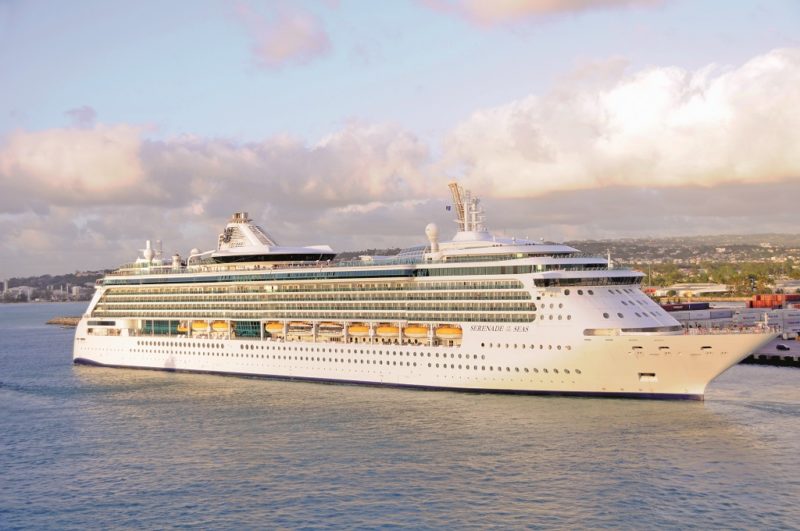
Barbados is an island country in the Lesser Antilles of the West Indies of 166 square miles in area, and is the most easterly of the Caribbean islands, lying around 120 miles east of St. Vincent and St. Lucia. There are eleven parishes on the island, with the parish of St. Michael having the port city of Bridgetown. Barbados is known as ‘Little England’ as it has the strongest links with Britain of all the former colonies in the Caribbean. The island is very flat with the only hills reaching just over one thousand feet in elevation. The landscape has a gently rolling appearance and the land is fertile, with lush and colourful vegetation. The sultry Caribbean climate is pleasant with top temperatures of 28° C with around 50 inches of rain per year. The western shore of Barbados has soft, sandy beaches, while the more rugged east coast offers dramatic rock formations formed by the pounding of the Atlantic Ocean.
The economy has always been largely reliant on sugar, rum and molasses, with tourism developed since the 1960s. The island has a rural society with a high population density of 1,200 people per square mile. The population of Barbados in 2019 was 287,025 with 115,000 living in Bridgetown, the capital. The first English colonists met no opposition when they landed in the early 17th century. The Spanish slavers had captured, killed or driven away the original Indian inhabitants and Spain had let its claim lapse. The island was abandoned and the only visible structure left in the Bridgetown area was a ramshackle bridge over the careenage and swamp that had been built by the Indians, thus its name of Indian River Bridge.
Internal self government was granted in 1961, and Barbados became an independent state within the Commonwealth in 1966.
It is interesting that Bridgetown was the only city outside the United States that was visited by George Washington (1732-1799) and President between 1789 and 1797. He stayed in George Washington House, which is included within the boundaries of the Garrison Historic Area. Two of his ancestors, Jonathan and Gerrard Hawtaine were early planters on the island, and their grandmother was Mary Washington of Sulgrave near Northampton and also Washington Hall near Sunderland. All of these historic buildings in Bridgetown were designated in 2011 as a protected area by UNESCO.
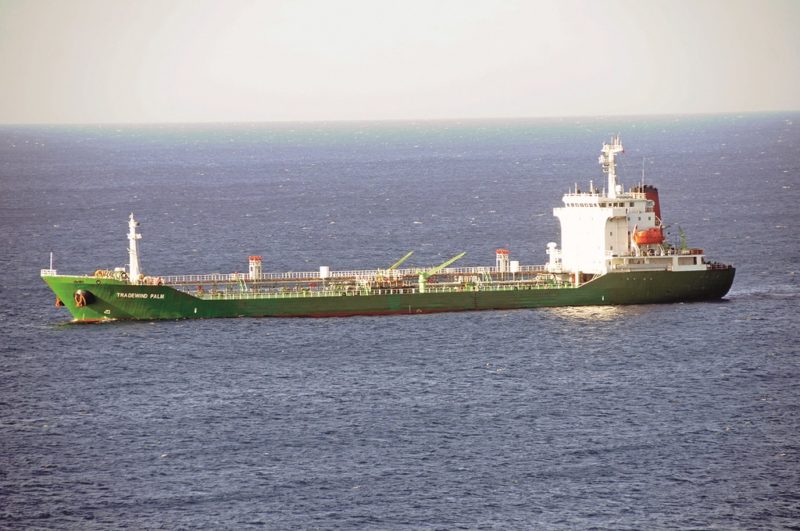
THE PORT OF BRIDGETOWN
Speightstown is the second largest town on the island after Bridgetown, and lies twelve miles up the coast from the latter on the north west coast of the island. Plans to build a deep water harbour at either of the two towns dated back to as early as 1694, when a harbour was being built at St. Michael (Bridgetown) only to be destroyed by a hurricane before completion. As Carlisle Bay was better sheltered than Speightstown, Bridgetown became the main port of the island for centuries until a Harbour Improvement Plan was submitted in 1915 to the House of Assembly, supporting the designs and report of John Coode, a specialist in harbour construction, who favoured a deep water harbour to be built in Carlisle Bay. Controversy raged throughout the island for the next forty years as to whether or not the island should have a deep water harbour.
A very favourable report by Sir Archibald Cuke of the island ability to manage a harbour construction project in 1955 led to the construction of the modern Port of Bridgetown (or Deep Water Harbour). This began in June 1957 by the firm of Richard Costain (West Indies) Ltd. with Coode & Partners providing the design, and a total cost of $28 million East Caribbean dollars provided by a British Government grant and public bank borrowing in London. It was completed in the first quarter of 1961 by creating a man-made isthmus of 90 acres of reclaimed land to the NW of the Careenage area and extending out into Carlisle Bay to Pelican Island, a small uninhabited island former quarantine island just offshore.
The new port was opened on 6th May 1961 by Sir Grantley Adams, Prime Minister of the West Indies, with the disappearance of Pelican Island, 600 yards off the port, after being firmly cemented into the Outer Breakwater. Three quarters of a million tonnes of stone and rubble were used to build the Deep Water Port, with stone blasted from a quarry at the former Bagatelle sugar plantation to make 30,000 blocks each of 20 tonnes, and with railway lines laid to transfer the blocks to the construction site. Dredging of the new harbour was done by the new cutter suction dredger Barbados, costing $1.92 million to build, and replacing an earlier dredger of the same name of 215 grt and built in 1972. The final stone block was lifted into place on the breakwater on 23rd July 1960 watched by Dr. Hugh Cummins, Premier of Barbados. He had overseen the project as Sir Grantley Adams, the previous Premier, had moved to the Federal Headquarters in Trinidad in 1958 to take up the post of Prime Minister of the West Indies Federation.
The passenger and cargo trade of T. & J. Harrison, founded in 1830, to the port had begun in 1921 after Royal Mail Line had withdrawn their Caribbean services. The Harrison Rennie passenger ships with Zulu names beginning with ‘In’ were transferred from U.K. to South Africa services to a London to Bridgetown, Port of Spain on Trinidad, and Demerara in British Guiana service. The loading berth was in the West India Dock on the Thames, and the trade continued until the containerised CAROL Caribbean service began in December 1976 by T. & J. Harrison, KNSM of Holland, Compagnie General Maritime (CGM) of France, and Hapag Lloyd of Germany, and used eight identical container ships of 1,550 TEU capacity built in Poland by Stocznia Gdanska. Some of these Continental owned container ships also operated on an extended service from the Caribbean through the Panama Canal to West Coast Canada and U.S.A. ports and returned to Continental ports.
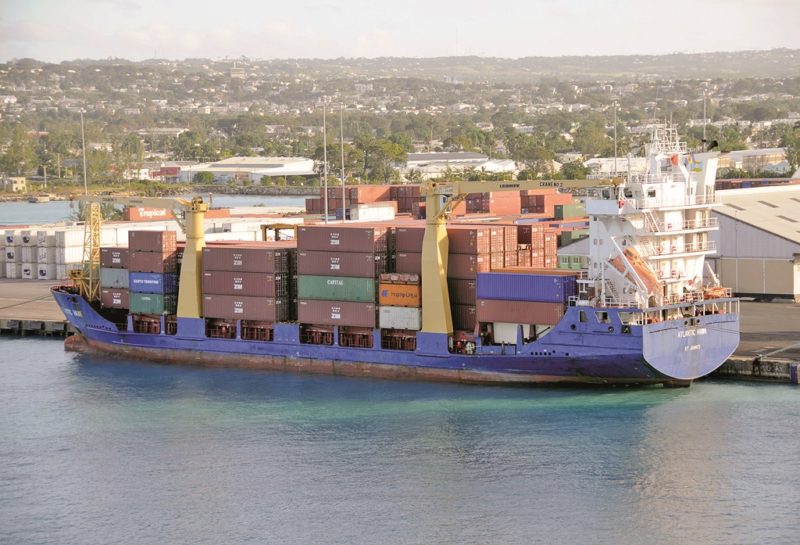
The five hold T. & J. Harrison cargo liner Diplomat of 8,202 grt and 9,770 dwt completed in 1953 by the Doxford yard at Pallion in Sunderland, was the first ship welcomed into the port on 10th March 1961 by Government ministers, House of Assembly members, civil servants, and the Harbour Master and port officials. She unloaded general cargo, foodstuffs and cola drinks, and reloaded for her next port of call at Port of Spain on Trinidad. The tugs Pelican of 204 grt built in 1961 and Culpepper of 150 grt built in 1964 were used at first in the new harbour, and were replaced by Pelican II of 4,660 bhp in the harbour fleet, as well as a second tug in Barbados II of 5,500 bhp, together with two pilot launches. The maximum length of ship handled is 244 metres, with extension to almost 300 metres in length if the vessel is fitted with bow and stern thrusters.
The new port handled 175,000 tons of cargo during its first year of operation, and had put an end to the offshore lightering of cargo from larger ships to the old wharves. Some 600 workers were re-employed when the new harbour system came in operation, with a sum of money set aside by the island government to relieve the plight of those workers displaced. The Bulk Sugar Terminal in the new port cost $4.5 million to build and was paid for by the Sugar Industry Price Stabilisation Fund.
The port is now a major port of entry for cruise ships and cargo ships docking in Barbados. The harbour underwent a $22 million expansion in 1978 to give seven berths in the enclosed new harbour, and a deep water dredging project by the Jan de Nul Group of Belgium was completed in 2002. The harbour is a coastal breakwater type, with berths alongside the breakwater and around the harbour for three large cruise ships, with a fourth cruise ship at the ‘cross’ berth. The lengths and alongside depths of all of the berths is now given:-
BERTH DEPTH QUAY
Breakwater 11.5 522 Cruise ship berth
Sugar Terminal 11.0 307 Sugar and molasses
Cross Berth 1 11.0 152 Small cruise and naval
Berth 2 11.0 183 Cruise & break bulk
Berth 3 11.0 183 Container & break bulk
Berth 4 11.0 184 Container ships
Berth 5 11.0 65 Feeder Container ships
N.Shallow Draft 6.8 156 Inter-island breakbulk
Bulk Facility 11.5 183 Dry bulkers
Oistins Tanker Berth 10.0 172 Tankers
Arawak Jetty 9.0 122 Tankers
Spring Garden Berth 5.0 103 Tankers
A sum of $100 million had been set aside for the equipping of the new harbour and the addition of Berth 5 with an additional length of 150 metres of quay length. The receipt and delivery of container cargo on Berth 5 is by a Panamax Gantry Crane and five diesel electric powered straddle carriers, reach stackers, tractors and trailers, plus smaller container handlers and forklifts. Storage of containers is on open ground or in warehouses, which for reefer containers is accommodated by 440 volt reefer plugs. Stuffing, destuffing and sorting of container cargo is carried out, with non container cargo covered on open stacking areas. Conveyor belts are used at the bulk handling quays, and vehicles are discharged from stern ramps of big car carriers of Hoegh Autoliners Inc. to open ground. Berth 6 is a future development in the north part of the port, and will provide an extra 300 metres of additional quay length. Training of all of the direct labour force is ongoing to ensure compliance with international standards in terms of quality and security. The port will embrace renewable energy forms and a green environment policy, while ensuring that the port remains as a competitive cruise and cargo port.
A Web Based Terminal Operating System (TOS) has all of the features that one would expect e.g. container inventory, gate processing by manual and video means, electronic manifest uploads, yard planning, management and utilisation of cranes and equipment, and real time tracking of containers and cargo for clients. When a cargo manifest is input to the portal of the system, all of the industry guidance (INDG) classification features are highlighted on the screens. This promotes safety and efficiency as every employee in the warehouse knows what and where all cargo is stored. New technology of the future will also be embraced to satisfy the needs of all clients. A new warehouse of 9,000 square metres is planned for the future, and will take the place of two smaller warehouses. The port is open between 0700 and 1700 hours every day.
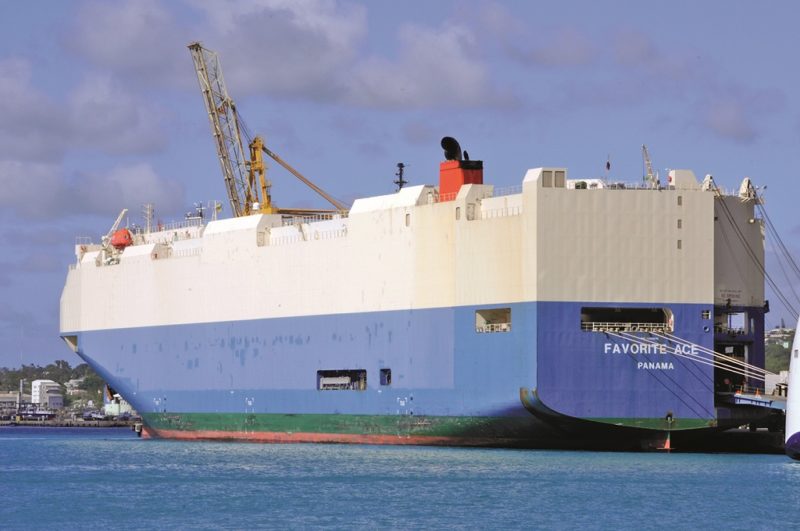
IMPORTS AND EXPORTS
The GDP of Barbados is $5.4 million Barbadian dollars, with imports of consumer goods, foodstuffs, construction materials, oil and chemicals, fuels and electrical components. The port handles up to 800,000 cruise passengers in a good year, and one million tonnes of containerised cargo in a year. The import sources are:-
Trinidad & Tobago 28.52%
U.S. A. 28.0 %
Colombia 7.13%
China 4.72%
United Kingdom 4.39%
Exports are light manufactured goods, sugar and molasses, cotton, rum, foods and beverages, chemicals, oils and chemicals. The export destinations are:-
Trinidad & Tobago 17.48%
Jamaica 15.63%
U.S. A. 8.93%
St. Lucia 8.13%
United Kingdom 5.36%

St. Vincent & Grenadines 5.04%
Antigua & Barbuda 4.12%
The area to the east of the main harbour houses the main container storage yard, reefer container yard, warehouses and sheds, the wharves for the inter-island passengers and cargoes, the new Cruise Terminal, the long Bulk Sugar Storage Warehouse and Terminal, the Port Administration Building, and the offices of the Barbados Investment and Development Corporation. The new Cruise Terminal berths also help to separate cruise traffic in the Deepwater Port from the container and bulk sugar traffic. Delays were being caused to container ships that have had to wait offshore for a day for the cruise ships to clear the harbour. The area to the north of the main harbour includes the Flour Mill and many other port related businesses. The Gatehouse to the Deep Water Harbour is on Princess Alice Highway and was opened in November 2000. The port has 592 employees, and more people are employed by the marinas, fishing wharves and tourist areas in and around the Careenage. The construction of the Deep Water Harbour increased the port depth from 9.6 metres to 11.6 metres, and dredged material from the bottom of the harbour was used to reclaim nine acres of land for port development.
CRUISE LINES CALLING AT BARBADOS
The resumption of world cruising from the late summer of 2021 after the year long crisis of serious COVID-19 infections grew stronger towards the end of 2021 and into 2022. Very few cruises operated for a year from June 2020 to June 2021. The cruise lines that have called at Bridgetown in the past have included Carnival Cruise Line, Royal Caribbean International (RCI), Celebrity Cruises, Club Med Cruises, Compagnie des Iles du Ponant, Costa Cruise Line, Crystal Cruises, Fred. Olsen Cruises, Hanseatic Cruises, Hapag Lloyd Cruises, Holland America Line, MSC Cruises, Majestic Cruise Line, Norwegian Cruise Line (NCL), P. & O. Cruises, Phoenix Seereisen, Regent 7 Seas Cruises, Residensea, Saga Cruises, Seabourn Cruises, Cunard Line, Sea Cloud Cruises, SeaDream Cruises, Seetours International, Silversea Cruises, Star Clippers, Swan Hellenic Cruises, Viking Cruises, Waybell Cruises (suspended), Westria Cruises, Windjammer Cruises and Wind Star Cruises.
Around twenty cruise ships in a good year are home ported at Bridgetown, with the Barbadian economy becoming the beneficiaries of this multi-million dollar business. Home ported cruise ships are offered special services that are not available to visiting cruise ships e.g. priority berthing, bunkering and provisioning, ship chandlery, ship agency, fresh water delivery, wet and dry waste management, cold storage areas, underwater inspections, meet and greet check-ins, direct person and baggage transfers under Customs Seal to and from Grantley Adams International Airport (GAIA), disabled vehicle assistance, and faster priority security screening and processing of passengers.
The cruise ship MSC Meraviglia of 171,598 grt and built in 2017 became the largest ship to call at the port in November 2019, beating the previous largest Quantum of the Seas of 168,466 grt.
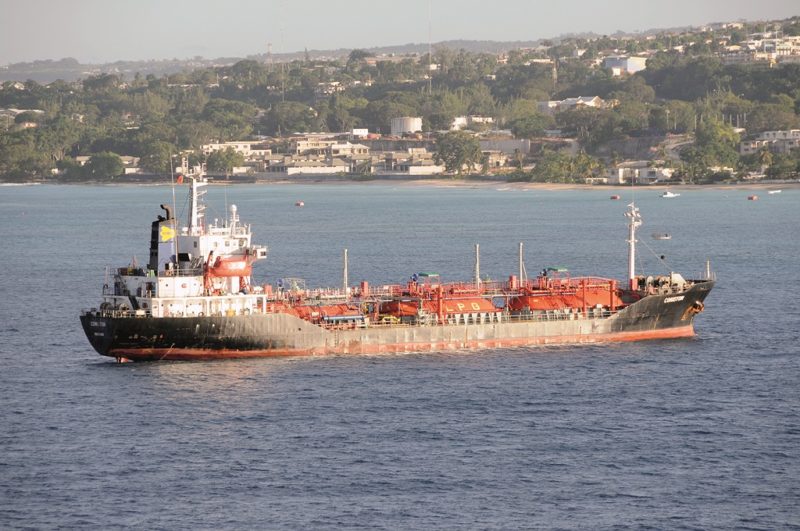
During 2019, a cruise passenger record of 853,200 from 422 cruise calls was obtained, an increase of 3% over the previous year. Marella Cruises made 45 calls in 2019 compared to 31 calls in 2018, and Aida Cruises and TUI Cruises also increased passengers arriving by increasing the size of their cruise ships. The projected total for 2020 of 427 cruise ship calls and an estimated 850,000 passengers was not met as the trade was badly hit by the COVID-19 pandemic with numbers significantly down. A hesitant return to normality was shown by the arrival of a dozen cruise ships during the four month period of 1st September 2021 until the end of 2021. These were Celebrity Equinox, Celebrity Silhouette, Explorer of the Seas, Radiance of the Seas, Vision of the Seas, Seabourn Odyssey, Viking Orion, Mein Schiff 3, Britannia, Royal Clipper, Marella Discovery and Aidaperla.
The Port of Bridgetown offers a complimentary, optional, shuttle bus service to move passengers quickly from their ship to the Cruise Terminal, and vice-versa. Steel bands always play in the Cruise Terminal when cruise ships are in port, and the visitor can browse among 61 shops to sample rum and food offerings, and buy that special momento item. Duty free shopping and the chance to buy authentic artisanal souvenirs should not be missed. Passengers who enjoy walking can then exit the main port gate and use a footpath that leads to the Pelican Craft Centre on the left and the historic Bridgetown shopping centre straight ahead, followed by a 20 minute walk to Central Bridgetown. A stone memorial with the figure of a pelican on top reminds the visitor of the former quarantine island that was swallowed up by the new deep water harbour. Pre-arranged shore excursion tours are readily available, if not one can use one of 255 registered taxis to explore Bridgetown and its sandy beaches.
CARGO VOLUMES HANDLED
Some 1,388 ship calls were made to the port in 2019 with total tonnage handled of 1.270 million tonnes, imports of 0.912 million tonnes, exports of 0.159 million tonnes, and almost 100,000 TEU of containers handled. The total bulk trade was 984,313 tonnes made up of in descending order of size in petroleum products, cement, grain, molasses, gypsum, iron ore, and sugar and molasses exports. Cargo shipping lines calling very regularly included the following:-
Tropical Shipping Weekly
Caribbean and Florida ports, 4 ships
Seaboard Marine Weekly
Savannah (Georgia) to Bridgetown, 2 ships
Caribbean Feeders Weekly
Circular Caribbean, 4 ships
King Ocean Services Monthly
U.S.A. ports to Caribbean ports
Geest Line Weekly
UK, Holland, France to Caribbean, 4 ships
CMA CGM Weekly
Circular Caribbean, 3 ships
Mitsui OSK Weekly
Far East and Japan to Caribbean
Zim Line Weekly
Far East to Jamaica and Barbados
Oslo Caribbean Line Monthly
Scandinavian to Caribbean service
Tropic Express of Tropical Shipping is a typical grey hulled Caribbean ro-ro with bridge forward, engines aft, and two container cranes of 40 tonne capacity on her starboard side, built in 2011 and sailing under the flag of St. Vincent and the Grenadines. She has an overall length of 107.0 metres, moulded beam of 21.0 metres, and loaded draft of 4.2 metres, and is of 3.744 grt and 5,100 dwt and carries 600 TEU of containers. Tropical Shipping have a large fleet of Caribbean feeder ships e.g. Tropic Confidence, Tropic Hope, Tropic Jewel, Tropic Lissette, Tropic Lure, Tropic Mist, Tropic Night, Tropic Opal, Tropic Palm, Tropic Star, Tropic Sun, Tropic Unity etc.
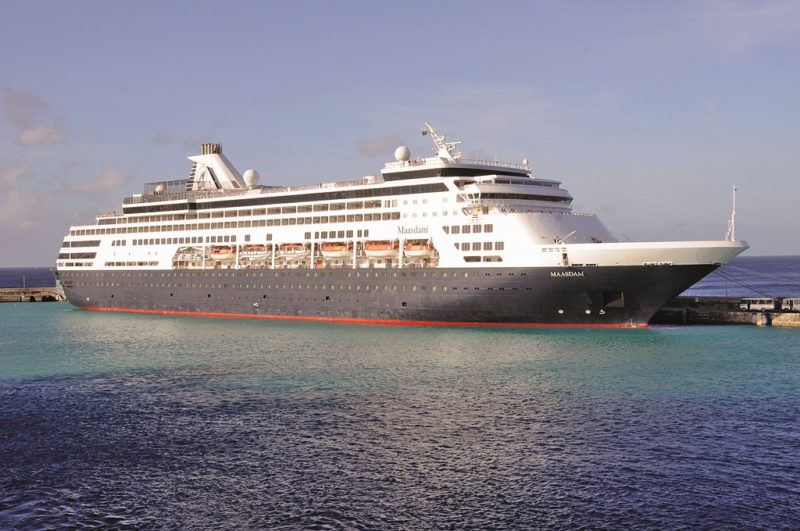
Seaboard Marine have a big fleet of 25 blue hulled feeder container ships on many routes throughout the Eastern Seaboard of the U.S.A. to Caribbean ports. The engines aft sisters Seaboard Ranger and Seaboard Ocean of 9,948 grt and 13,670 dwt provide a weekly service between Savannah (Georgia) and Barbados. They have dimensions of overall length of 148.0 metres, moulded beam of 24.0 metres, and a loaded draft of 7.4 metres, with two container cranes of 40 tonnes capacity to handle their cargo of 800 TEU of containers.
A Home Delivery service is operated by the port for small items of cargo e.g. small paper rolls and items of low weight in order to reduce the need for importers and consignees to spend time picking up cargo. The COVID-19 pandemic also greatly reduced the number of visits to the port as an appointment system was introduced on 14th April 2020 for all visitors.
ADMINISTRATION of the PORT of BRIDGETOWN
The administration responsibility for the port has lain with the CEO of Barbados Port Inc. (BPI) since 2003 when the Barbados Port Authority was privatised. As a statutory body, it oversees all matters relating to the efficient operations in the port facilities. The BPI also advises the Ministry of International Business and International Transport, which have the ultimate responsibility for the Deep Water Harbour. The port has been awarded the title of ‘Caribbean Port of the Year’ and ‘Best Multi-Purpose Terminal in the Caribbean’ for eight years. It is affiliated to the Ports of Miami and Palm Beach in Florida, and also Tema in Ghana and Manzanillio International Container Terminal in Colombia.
The port body is a Member of the American Association of Port Authorities, the Caribbean Shipping Association (CSA), and the Port Management Association of the Caribbean (PMAC), the Shipping Association of Barbados (SAB), and an affiliate of the Caribbean Maritime Institute (CMI). The port is thus a top rated Caribbean port along with the equally important Port of Kingston in Jamaica, and the Port of San Juan on Puerto Rico.
The Administration Building was opened in September 1979 by Prime Minister J. M. G. ‘Tom’ Adams. The Board of Directors consists of a Chairman, Deputy Chairman and eight directors, with the management team of the Port of Bridgetown consisting of a Managing Director and CEO, Port Operations Manager, Development and Strategy Manager, Financial Controller, Human Resources Manager, Project Operations Manager, Terminal Operations Manager, Business Development and Corporate Communications Manager, Harbour Master, and eight engineering managers.
The vision of the port is to be the most innovative green maritime hub in the world by 2030, replacing diesel powered port equipment with electrically driven alternatives.
Scheduled guided bus tours of the Port of Bridgetown are offered to business groups, associations, social clubs, and individual groups. The tours last from one to two tours visiting the Pelican Island Monument, Sugar Bulk Facility, Cruise Terminal, Cruise Transfer Terminal, Cargo Sheds 2 and 4, Shallow Draft inter island facility, and the Reefer Container Park. Visits are only by bus, with cost and security clearances made by the groups, and visitors only alighting at designated points in the port and not allowed to stray around the port.
The Marine Services Department of the Port of Bridgetown provides the following services:-
- Compulsory pilotage, except for naval vessels, training ships and small craft, and tug attendance, which is compulsory for vessels over 1,000 grt or 168.0 metres in length.
- Mooring and unmooring craft.
- Provision of potable water.
- Fire-fighting, pollution control, rescue and salvage operations.
- Marina supervision.
- Provision of Aids to Navigation.
- Turning Basin depth of 12.5 metres, and Approach Channel depth of 13.5 metres on a bottom of sand and coral.
- Entry all day and night with tides negligible and currents of half a knot.
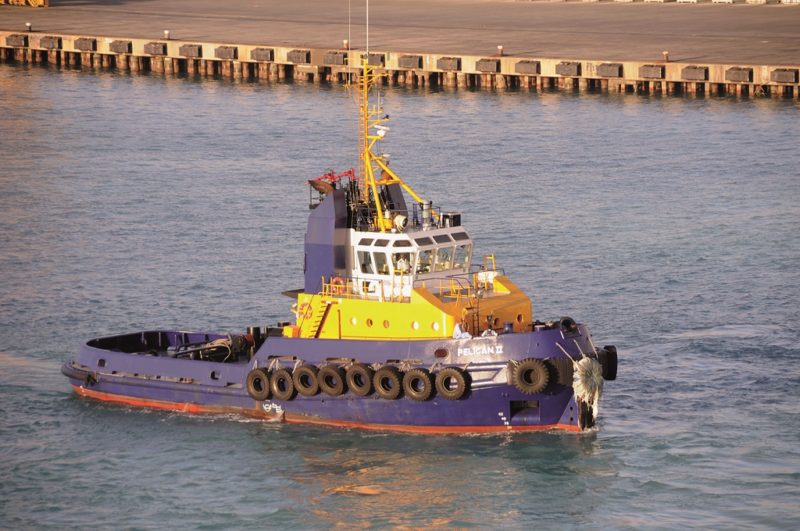
POSTSCRIPT
The Barbados Coast Guard (BCG) was established in August 1974 for the roles of Search & rescue (SAR), illegal entry of people and goods, enforcing the law against the dynamiting of fish in coastal Barbadian waters. The BCG is also responsible for the enforcement of the provisions of every law relating to the harbour, port or coastline, quarantine, immigration, fisheries, territorial waters, economic zones, safety at sea, customs and excise, plus removal of persons from ships when requested by the Master.
In 1981, the BCG base Willoughby Fort was commissioned and decommissioned in 2007 when the new base Pelican was commissioned at Spring Garden in Bridgetown. The BCG fleet has three patrol vessels in Trident (P01), Leonard C. Banfield (P02), and Rudyard Lewis (P03), four utility fast patrol boats of 40 feet in length, eight inflatables, and two Fairchild C-26 maritime patrol aircraft, and a force of 127 full time personnel.

Sixty years of successful operation of the Port of Bridgetown Deep Water Harbour have made the port into a very successful Caribbean operation. I wish to thank an excellent booklet written by Warren Alleyne entitled ‘Historic Bridgetown’ and published by the Barbados National Trust in 1978, and the equally excellent website of the Port of Bridgetown at www.barbadosport.com.




Comments
Sorry, comments are closed for this item